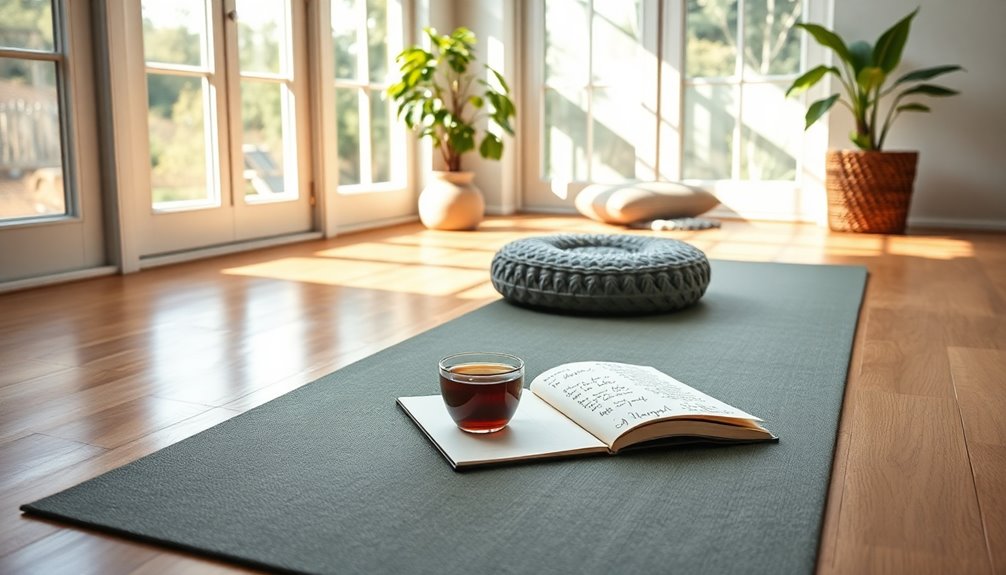Balanced living means integrating different areas of your life to support mental wellness and overall happiness. It's about recognizing the connections between your physical health, emotional well-being, and social interactions. Prioritize self-care routines, manage your time effectively, and set boundaries to avoid burnout. Nurturing relationships and engaging in activities you love can rejuvenate your spirit. Mindfulness practices like meditation or nature walks help ground you in the present moment. Embracing these elements fosters a sense of fulfillment in daily life. Keep exploring these ideas, and you'll uncover more ways to cultivate balance and joy in your routine.
Key Takeaways
- Balanced living prioritizes mental wellness, integrating self-care routines to enhance overall well-being and fulfillment in daily life.
- Engaging in physical activities, such as glute-specific movements, strengthens the body and supports mental health.
- Effective time management, including setting boundaries and incorporating breaks, fosters control and prevents burnout.
- Nurturing relationships through active listening and empathy enhances emotional well-being and creates a sense of belonging.
- Mindfulness practices, like meditation and gratitude journaling, promote presence, reduce stress, and enhance appreciation for daily experiences.
Understanding Balanced Living

Balanced living is more than just a buzzword; it's a holistic approach to your daily routine that can dramatically enhance your well-being. You might often find yourself juggling multiple responsibilities, aiming for that elusive work-life balance. It's easy to feel overwhelmed, but understanding balanced living can empower you to reclaim control over your life.
At its core, balanced living means recognizing the interconnectedness of your mental wellness and daily activities. It involves carving out time for work, relationships, and personal interests without letting one overshadow the other. When you prioritize mental wellness, you're not just managing stress; you're creating a foundation for a fulfilling life. Additionally, engaging in glute-specific movements can enhance both physical strength and mental wellness, contributing to an overall sense of balance.
Think about your daily routine. Are you giving equal importance to your professional and personal needs? Or do you often find work seeping into your downtime? Striving for a healthy work-life balance isn't just about time management; it's about nurturing your mental health. Set boundaries that support your well-being.
Engage in activities that bring you joy—whether it's spending time with loved ones, pursuing a hobby, or simply enjoying a quiet moment. Each small step you take towards balanced living contributes to a more harmonious and satisfying life. Remember, you deserve a space where every part of you can thrive. By embracing this holistic approach, you'll not only enhance your daily existence but also foster a sense of belonging within your community.
The Importance of Self-Care

To truly embrace balanced living, you can't overlook the importance of self-care. It's not just a luxury; it's crucial for your mental health and overall well-being. When you prioritize self-care, you're actively managing stress and strengthening your ability to cope with life's challenges. It's a way to show yourself the love and respect you deserve.
Here are some key aspects of self-care to keep in mind:
- Physical Activity: Engaging in regular exercise boosts your mood and energy levels.
- Mindfulness Practices: Techniques like meditation or deep breathing can greatly enhance your stress management skills.
- Social Connections: Spending time with loved ones can provide emotional support and foster a sense of belonging.
- Hobbies and Interests: Pursuing activities you enjoy can rejuvenate your spirit and help you reconnect with your passions.
Incorporating mindfulness meditation into your self-care routine can further enhance your ability to navigate the stresses of daily life.
Time Management Techniques

Juggling various responsibilities can often leave you feeling overwhelmed, but mastering time management techniques can transform your daily routine into a more manageable and fulfilling experience. By prioritizing tasks, you can focus on what matters most, ensuring that your energy is spent on activities that align with your values and goals. Start each day by listing your tasks, categorizing them into urgent and important. This simple exercise helps you tackle what needs your immediate attention and what can wait.
Creating boundaries is another pivotal aspect of effective time management. It's all too easy to say yes to every request that comes your way, but this can lead to burnout. Learn to say no when necessary, and don't hesitate to set limits on your time.
For instance, designate specific hours for work, family, and self-care. This clarity not only protects your time but also fosters a sense of control over your life.
Don't forget to incorporate breaks into your schedule. Taking short pauses can recharge your brain, improve focus, and enhance productivity. Remember, balancing your responsibilities doesn't mean cramming more into your day; it's about being intentional with your time. Additionally, maintaining a natural cycle of productivity, similar to the way our ancestors managed their eating patterns, can enhance your overall efficiency and well-being.
In practice, these techniques will help you cultivate a sense of belonging in your life, as you create space for what truly matters. Embrace these strategies, and watch how they can lead you to a more balanced and fulfilling existence. You've got this!
Nurturing Relationships

Amid the hustle of daily responsibilities, nurturing relationships often gets pushed to the back burner. Yet, these connections are crucial for your emotional well-being. Building strong relationships isn't just about spending time together; it's about enhancing your communication skills and emotional intelligence. When you genuinely connect with others, you create a sense of belonging that enriches your life.
Here are some key practices to help you nurture your relationships:
- Prioritize Conversations: Make it a point to engage in meaningful dialogues. Listen actively and share openly to deepen your connections.
- Show Appreciation: Recognize the efforts of your loved ones. A simple "thank you" or a compliment can go a long way in strengthening bonds.
- Be Present: Put away distractions when you're with someone. Quality time spent without interruptions fosters intimacy and understanding.
- Practice Empathy: Try to see things from the other person's perspective. This enhances emotional intelligence and helps you respond thoughtfully.
In addition to fostering connections, embracing a plant-based diet can also contribute to your emotional well-being through improved overall health and vitality.
Mindfulness and Presence

Life often pulls you in many directions, making it easy to overlook the present moment. Yet, cultivating mindfulness and presence can transform your daily experiences. By practicing present moment awareness, you not only enhance your connection to yourself but also to those around you. This isn't just about slowing down; it's about truly engaging with your life as it unfolds.
One way to foster this awareness is through a consistent meditation practice. Even a few minutes each day can ground you, helping you appreciate the here and now. Imagine what it feels like to fully engage with each moment, instead of rushing through them. InnaPeace offers deep meditation states that can enhance the effectiveness of your mindfulness practice.
| Mindful Practices | Benefits |
|---|---|
| Deep Breathing | Reduces stress and anxiety |
| Gratitude Journaling | Enhances positivity |
| Nature Walks | Boosts creativity and calm |
When you embrace mindfulness, you create space for reflection, joy, and connection. You'll notice the small wonders—a smile from a stranger, the warmth of the sun, or the laughter of loved ones. These moments matter, and they deserve your attention.
Setting Realistic Goals

Setting realistic goals is crucial for maintaining balance in your daily life. When you set achievable targets, you create a roadmap to success that keeps you motivated and focused. Unrealistic goals can lead to frustration and burnout, making it more challenging for you to find that sweet spot of balance. Here's how you can set yourself up for success:
- Be Specific: Instead of saying "I want to be healthier," try "I'll exercise for 30 minutes, three times a week."
- Make it Measurable: Having concrete numbers helps you track your progress and celebrate small wins along the way.
- Keep it Attainable: Guarantee your goals fit within your current lifestyle and obligations. If you're juggling work and family, a goal should be realistic and manageable.
- Set a Timeframe: Having a deadline creates urgency and helps you maintain momentum. Set short-term milestones to keep you motivated.
Additionally, it's important to remember that your health and diet choices, like following a custom keto diet plan, can significantly impact your ability to achieve your goals.
Integrating Hobbies and Interests

Integrating hobbies and interests into your daily routine can greatly enhance your overall well-being and balance. When you engage in activities that spark joy, you're not just filling your time; you're finding purpose and nurturing your personal development. It's essential to carve out moments for what you love, as this fosters not only happiness but also a sense of belonging. Additionally, maintaining a healthy balance of gut bacteria can support your emotional well-being, further enriching your experiences as you pursue your hobbies.
Consider the table below to help you identify and prioritize your hobbies:
| Hobbies/Interests | Benefits | Time Commitment |
|---|---|---|
| Gardening | Reduces stress, connects with nature | 1 hour/week |
| Painting | Boosts creativity, enhances mood | 2 hours/week |
| Volunteering | Builds community, fosters empathy | 4 hours/month |
As you incorporate these activities, don't feel pressured to excel; rather, focus on the joy and satisfaction they bring. You might find that spending time on your hobbies not only enriches your life but also fosters connections with like-minded individuals.
Evaluating and Adjusting Your Balance

Finding balance in your daily life requires regular scrutiny and adjustment. Life's demands can shift, making it essential to check in with yourself to verify you're not tipping the scales too far in any direction. You might find that work life is consuming your time, leaving little room for health fitness or personal interests. By evaluating your current balance, you can make proactive changes that promote a more fulfilling existence.
Here are some steps to help you scrutinize and adjust your balance:
- Reflect on your daily activities: Are you dedicating enough time to work, health, and personal interests?
- Identify stress points: What areas of your life feel overwhelming? Is it work deadlines or neglecting your fitness routine?
- Set achievable goals: Create small, manageable objectives to focus on each week, allowing you to gradually shift your balance.
- Check your support system: Surround yourself with people who encourage balanced living, whether through shared fitness goals or work-life harmony.
- Incorporating activities like mini band workouts can also help you maintain physical health while balancing daily responsibilities.
Frequently Asked Questions
How Can I Identify When My Life Feels Unbalanced?
You can identify when your life feels unbalanced by tuning into your emotions and energy levels. If you're feeling overwhelmed or stressed, it's a sign to reassess your self-care practices. Incorporate mindfulness techniques, like deep breathing or meditation, to center yourself.
Pay attention to your boundaries; if you're constantly saying yes, it's time to prioritize your needs. Effective time management can also help you regain control and create a more harmonious life.
What Are Signs of Burnout Related to Imbalance?
When life feels like a never-ending race, you might notice signs of burnout creeping in. You're likely experiencing fatigue, irritability, or a lack of motivation. These are gentle nudges reminding you to focus on mental health maintenance.
To prevent burnout, listen to your body and take breaks. Embrace self-care practices that restore your energy. Remember, you're not alone in this journey; prioritizing balance fosters a sense of belonging and wellness.
Can Balanced Living Improve My Physical Health?
Yes, balanced living can greatly improve your physical health. When you prioritize balance, you're likely to boost energy levels and enhance your overall well-being.
With improved focus, you'll find it easier to engage in regular exercise and make healthier food choices. This positive shift not only strengthens your body but also fosters a sense of belonging and connection with others who value similar lifestyles.
Embrace balance, and watch your health transform!
How Does Work-Life Balance Affect Relationships?
Work-life balance greatly influences your relationships. When you manage work stress effectively, you create space for deeper connections. Improved communication skills thrive when you're not overwhelmed, allowing you to express your needs and listen to others better.
This balance nurtures empathy and understanding, which are essential for fostering relationships. Remember, prioritizing your well-being not only benefits you but strengthens the bonds you share with loved ones, helping everyone feel more connected and valued.
Are There Apps That Help Track My Balance?
In a world bursting with endless possibilities, discovering the right apps to track your balance can feel like finding a needle in a haystack. Luckily, wellness trackers and lifestyle monitoring apps are here to help. They can guide you in evaluating your habits, setting goals, and nurturing your overall well-being.
Conclusion
In the grand circus of life, juggling self-care, time organization, and relationships might seem like a challenging act. But don't worry; you're not auditioning for a reality show! Aim for balance, and remember, it's perfectly okay to drop a few balls along the way. Embrace your quirks, set those achievable goals, and carve out time for your passions. After all, life's too short to take too seriously—so let's master this balancing act with a wink and a smile!



